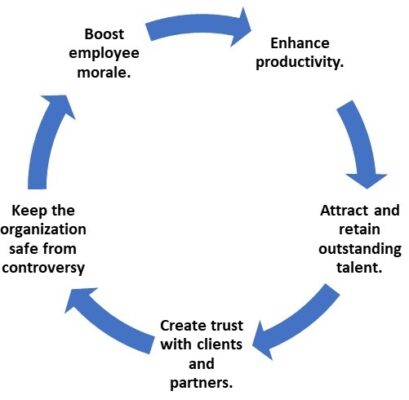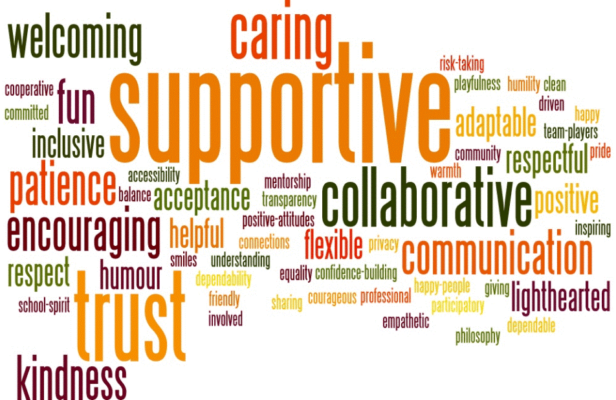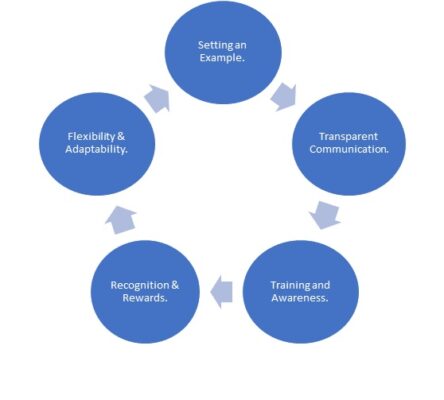Work culture and ethics are two major threads in the intricate tapestry of the modern professional world. Just as the rhythm of a dance can either enchant or dismay, the interplay between these two elements can shape the destiny of organizations and individuals.
In this blog, we will explore the captivating synergy between work culture and ethics and how they weave the fabric of success.
The Initial Phase: Defining the Work Culture
Imagine stepping into a workplace where people grin while they interact, collaborate, and work with smiles on their faces. Envision another work environment where hostility and mistrust pervade the atmosphere. What’s the difference? Work culture.
Work culture, at its foundation, comprises the values, beliefs, conduct, and attitudes that represent an organization. It is the distinct personality that a company projects to its employees, clients, and everyone else.
A healthy work culture is built on transparency, respect, inclusion, and mutual support. A work culture which encourages cooperation and teamwork, for example, is more likely to promote ethical behaviour. When individuals sense that they are part of a team, they become more inclined to be willing to do what is best for the firm.
Ethics: The Moral Compass
Ethics, on the other hand, might be conceived of as the moral compass that directs the operations of an organization. Making judgments in accordance with ideals such as integrity, honesty, equality, and accountability is ethical behaviour. In a fast-changing world, ethics serves as a balancing hand, assisting organizations in navigating complex challenges and shifts while upholding their essential principles.
An Ethical culture could help to foster a courteous and inclusive workplace culture. Employees who believe they are treated equitably and with respect are more likely to be committed and productive. It values diversity, supports personal development, and promotes an ideal work-life balance. Employees who feel appreciated and empowered become determined contributors, encouraging creativity, and drive the organization towards success.
 What is the significance of work culture and ethics?
What is the significance of work culture and ethics?
Work culture and ethics are critical for a variety of reasons. They are able to:
- Boost employee morale. Employees who feel appreciated and respected are more likely to be motivated and interested in their job.
- Enhance productivity. A favourable work environment can contribute to higher productivity since employees are more likely to be dedicated and efficient.
- Attract and retain outstanding talent. Employees prefer to work for companies with a strong work culture and moral standards.
- Create trust with clients and partners. Partners and clients are more willing to conduct business with companies that have a good reputation for ethics.
- Keep the organization safe from controversy. An ethical culture can assist to avoid unethical activity, which may damage the company’s image and financial line.
The Symbiotic Relationship: How Culture Shapes Ethics and Vice versa
The relationship between work culture and ethics is an ever evolving one. Setting clear goals, fostering open communication, and developing a sense of responsibility can all serve to encourage ethical conduct in the workplace. Employees who feel supported and respected are more inclined to adhere to ethical rules, particularly when given challenging choices.
In contrast, ethical issues shape and strengthen workplace culture. Organizations that place importance on ethics possess a trustworthy reputation, attracting people who align with their values. This creates a self-perpetuating cycle: when ethical employees are drawn in, they contribute to a favourable work culture, which promotes ethical behaviour.
The Difficulty: Navigating the Grey Areas
However, the connection between work culture and ethics is frequently obvious. In certain cases, organizational cultures may inadvertently support behaviour that is unethical. A hyper-competitive workplace that prioritizes outcomes over everything else, for example, might lead to unethical work atmosphere.
Similarly, confronting moral dilemmas inside a well-established corporate culture can be difficult. Upholding ideals may conflict with conventional norms or behaviours, necessitating courage as well as solid leadership to navigate the ship into ethical seas.
Importance of Creating a Harmonious Symphony
Creating a perfect balance of work culture and ethics necessitates a purposeful effort on the part of both organizational leaders and employees. Here are some methods to cultivate this symbiotic relationship:
Set a good example: Ethical behaviour must start at the top. Leaders must exemplify the values they want their employees to have.
Encourage transparent and honest communication: Communicating honestly and openly is vital for establishing confidence and ensuring that everyone knows what constitutes ethical behaviour.
Training and education: Frequent workshops on ethics can help staffs understand the significance of making ethical choices and how it corresponds with the company’s core principles.
Recognition and Rewards: Ethical behaviour should be acknowledged and rewarded to reinforce its importance and others must be encouraged to follow suit.
Flexibility and adaptability: Work culture and ethics must be adaptive to changing conditions while staying grounded in core principles.
How to create a work culture that is both ethical and thriving?
Here are a few tips:
- Begin by setting clear expectations. Make certain that everyone in the organization realizes what is expected of them in terms of both work culture and ethics. This includes regulations such as a code of conduct, conflict of interest policies, and sexual harassment policies.
- Celebrate accomplishments. When employees do well, it is important to recognize and reward them. This will contribute to the creation of a good and satisfying work environment.
- Create possibilities for growth and development. Employees want to feel like they are progressing and advancing in their careers. Give them chances to gain new talents and face new difficulties.
- Create a sense of belonging. Employees desire to be a member of a team. Create chances for workers to get to know one another and form connections.
- Be honest and direct. Employees must have faith that the company is being truthful with them about its principles and procedures. This includes being open about matters like remuneration, promotions, and decision-making procedures.
- Promote open discussion. Employees must feel safe speaking out if they notice anything is misleading. Create an environment in which employees can voice issues without fear of reprisal.
- Hold individuals responsible. When an employee breaches the organization’s code of conduct or ethical standards, they must face repercussions. This may not always imply firing someone, but it does imply taking action to address the issue in question.
- Pay attention to feedback. Be receptive to employee input. This will assist you in identifying areas where the work culture can possibly be improved.
These tips are important to attract and retain top talent, boost employee morale, and increase productivity.
A Promising Future
As organizations continue to change, the synergy between work culture and ethics will keep determining their fates. An authentic workplace environment that promotes ethical behaviour could contribute to enhanced employee happiness, a better business reputation, and a profitable future. Organisations that grasp and embrace the core interplay between workplace norms and ethics, like skilled dancers, are positioned to produce a symphony of accomplishment that resonates well beyond the limits of the professional world.
Warning: Trying to access array offset on value of type bool in /home4/interua3/ilca.in/wp-content/themes/flatsome/inc/shortcodes/share_follow.php on line 41


